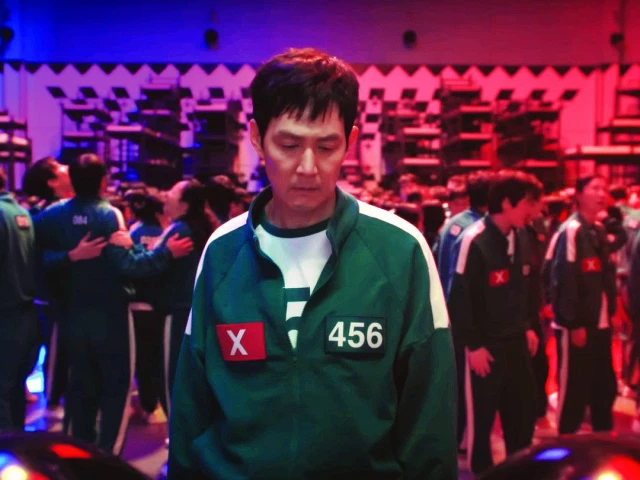A test round?
Squid Game 2' poses more questions than it answers

Netflix's dystopian series Squid Game is back with another death-dealing set of childhood games on its gruesome agenda. Opening with a customised logo to reimpose its footprint on the streaming platform, the second season promises a scrupulous narrative in the way of its pre-established themes.
If you're wondering whether or not the series delivers on that loaded promise, well, that remains to be seen. Squid Game 2 loyally depicts everything we already know - the profligate supervisors of the game, the desperation of the needy, the brutality it takes to score unimaginable wealth, and so forth - but it falls short of stringing it all together like its predecessor did.
A substantial supplement
Season 2 picks up right where the story left off - with Gi-hun (Lee Jung-jae) and his altered resolve. After surviving the savagery of the games, our protagonist is on the way to reunite with his daughter. However, witnessing a stranger fall prey to the cycle like he did at the beginning of the show compels him to abandon his domestic pursuit and settle the score once and for all.
The audience follows Gi-hun through a speed-run of the following years, which are spent in hunting down the recruiter (Gong Yoo) who lures eager passersby to the games. It is through this plot point that the show does an excellent job of revisiting a character the audience already knows in order to add more depth to his motives.
We learn that the poker-faced, methodical recruiter has more to himself than he lets on. He entertains an appetite for viciousness in the same vein as the consumers of the games do, which aligns well with the overall theme of the series. Much like the previous season, Gong Yoo's performance stands out once again, this time with a wider platter of emotions.
Strength in numbers
The characters continue to anchor the show in the second season as well. This time around, too, the audience is introduced to a cast of individuals that band together to push the plot forward. From debt to disease, they each heave a motivation that makes us root for their survival.
The most interesting addition of all is the defector No-eul (Park Gyu-young) whose presence offers a closer look into the operations of the games, as she is compelled to join them not as a player, but as a pink-hooded guard. Her perspective is fresh insight into the bloody nature of the extravaganza, bearing a much-needed reminder that the masked soldiers aren't mechanical lackeys but multifaceted individuals themselves.
Even the black-hooded Front Man (Lee Byung-hun) is accorded a greater role in the games the moment he resorts to micro-management. Viewers are aware how this introduces new stakes to this second round of games, especially with the vengeful Gi-hun being forcefully reinstated as Player 456 once his plans are thwarted by the overseers of the game.
Bold choices
This season brings greater complexity, especially as we start seeing familiar characters in a new light. However, bold choices tend to be reduced to accentuating shock value if they leave audiences with more questions than the season has time to answer.
A certain infiltration appears to be a long-term tactic of manipulation by the enemy side. Granted, it sells what it means to. But to what end? What purpose is this long game meant to serve other than keeping viewers at the edge of their seats?
Indeed, the suspense is jarring and makes you wonder if characters will veer away from their pre-decided paths through a change of heart. However, when motivations are unclear, it is difficult to do these stakes justice.
Questions upon questions
On the other hand, Gi-hun's re-entry into the games was an expected narrative direction. It's reminiscent of Katniss being thrown back into the Hunger Games in Catching Fire, in that there would be no plot without it.
There is novelty in watching protagonists experience familiar hostile territory once more, now with their innocence no longer intact. The unbridled anger is a treat that echoes the sentiments of viewers still mourning characters from the previous season. However, beyond that novelty, Gi-hun's stone-cold attitude towards something that should trigger panic gets old quickly.
Understandably, his head is clouded with vengeance. But complete detachment is a response that hardly makes sense for a reckless man with a strong sense of empathy. Not once is he rendered unnerved by the familiar walls, music, or uniforms. He is simply immune to the environment that has haunted him for years.
Perhaps, that can be explained by the fact that he no longer holds regard for his life and is solely focused on his mission to end the games. However, in the context of how naively he trusts those around him, even that falls out of the realm of reality. And the worst part is, this unchecked determination causes him to risk the lives of those who do stand by him.
Sifting for answers
Gi-hun's confusing morality dooms both the characters and the narrative. He isn't willing to take difficult yet reasonable methods of precaution, but he seems fine with endangering the lives of those who are hung on his every word. But maybe he is a cautionary tale. Except, we never find out if that's the message of the season.
In fact, we don't find out much of anything since the season hardly stands on its own. While the cliffhanger is strong, it hits the inquiring viewer too suddenly to have the intended effect. Plotlines are left unknotted. For instance, Jun-ho's (Wi Ha-jun) stakeout on the outside only introduces more suspense as the season inches to a close.
Due to this, Squid Game 2 only feels as though it's meant to be a set-up for a third installment, not a story on its own. Perhaps, if some of the secondary queries hinted at an answer, a satisfactory conclusion could be reached.
However, this doesn't eliminate hope for what is to come. If the third season has a strong rebuttal in store then the show has a fair chance of proving that it hasn't been written into a corner.



















COMMENTS
Comments are moderated and generally will be posted if they are on-topic and not abusive.
For more information, please see our Comments FAQ